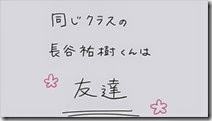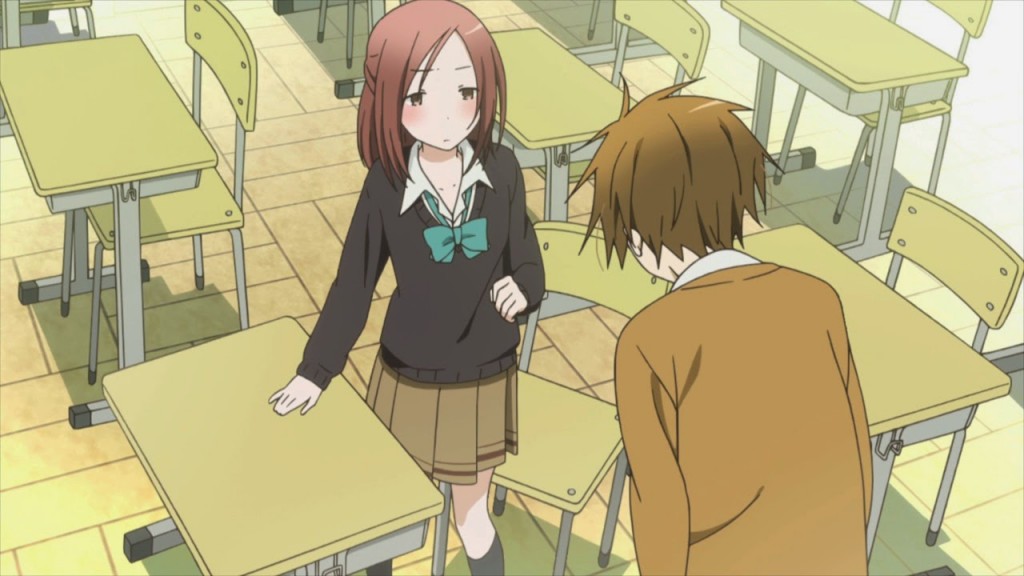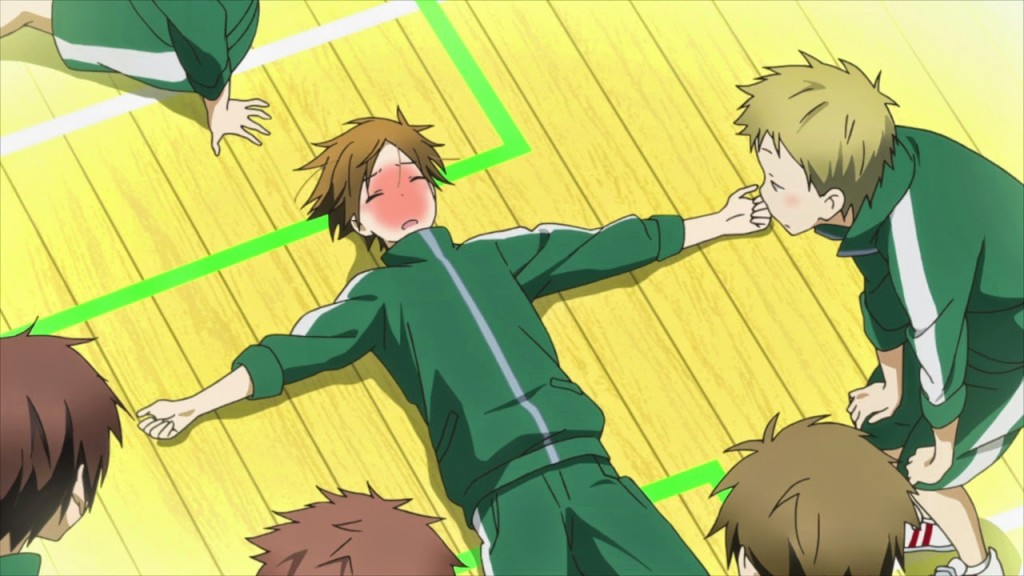 |
 |
 |
In my continuing belief that there’s a Seinfeld quite for every situation, Isshuukan Friends is like gossamer – and you don’t dissect gossamer.
For the second time in as many weeks I’m going to reference Sekai Soredemo wa Utsukushii in talking about this series. It’s not as though the two shows are all that similar, but I do sense something common in the reactions – especially as regards the second episode of Sekai Soredemo. In both cases I think we’re talking about something that can only be appreciated with a certain suspension of disbelief and, even more, a rejection of cynicism. Trying to explain why the scene at the end of that episode or pretty much everything that’s happened in this series effect you is like trying to describe the color blue or what “sweet” tastes like (without saying “sweet”). I think you pretty much either get it, or you don’t.
To some extent that’s the reason why I said last week that if the first episode of Isshuukan Friends didn’t work for you, it probably isn’t going to. If you’re waiting for the other emotional shoe to drop, you’ll be waiting for a long time. Things will change over the course of this series – characters and relationships will develop and gaps will be partially filled in – but there’s no game-changer coming in terms of emotional tone. These people are exactly who they seem to be, and their situation is painful exactly why it seems to be. If you feel connected to that, I suspect that connection will only grow. If you don’t, I doubt very much whether that will change.
I’m not sure how well the specifics of One Week Friends hold up to analysis (gossamer, you know) but Kaori’s strange condition is certainly what defines the series, both in literal and metaphorical terms. I was never more reminded of Memento than with these chapters, which focus heavily on her decision to keep a diary – a decision that’s strongly influenced by Yuuki (in essence, he’s the one that suggests it). It seems self-evident that keeping a diary is something someone in Kaori’s situation would do (recall the endless notes around the apartment in Mememto), and thus, it’s perfectly logical for Yuuki to suggest it. Sure, he has a selfish reason – having to go through the ordeal of “friendship confessing” over and over isn’t easy. But there’s also a profound desire to help Kaori maintain the essence of who she is.
With the benefit of distance, of course you and I know it can’t possibly be that easy. The relevant question, for me, is why Kaori hasn’t been keeping a diary all along? As she and Yuuki go through their second week together, a perfectly normal first romance that’s at the same time unique, Kaori dutifully records everything that’s happening and even what she’s feeling. The most profound event comes on Sunday, the day before her memories fade. It starts out as a “date” for crepes (at the same place she wanted to visit a week earlier) and ends up at a karaoke club. In addition to the obvious relationship implications of such a place (and the hilarious disco ball moment) it’s obvious that karaoke is an essential part of high school social life that Kaori has always longed to experience, and it doesn’t disappoint.
That night Kaori leaves herself a note to check her diary in the morning, and that “Hase-kun is my friend” – but after she kills the lights she bolts upright and writes in her diary again. What is she doing – crossing out her entries? Fictionalizing events to make forgetting them less painful? We don’t know – but it becomes clear the next day that she was, in fact, asking God to let her remember Yuuki. And this is of course the reason she doesn’t keep a diary (likely, she did once and stopped) – because it was simply too painful to see the heartfelt words on the page and feel no emotional connection to them. She lies for Yuuki’s benefit, telling him she does remember bits and pieces, but he sees through this quickly enough – and feels even more guilty for forcing her to lie, in addition to keeping the diary in the first place.
In truth this is really a very simple, very sad story of two incredibly nice people coping with pain. Iwasaki-sensei is wisely keeping it very simple in the adaptation too, letting the emotions carry the story. Again, this is such a perfect fit for Brains Base – the look of the series is a cross between Natsume Yuujinchou and Art Director Ito Akira’s Hourou Musuko, and it suits the material perfectly. The music is beautiful but unobtrusive and used sparingly, and the relatively inexperienced lead seiyuu project an awkwardness and innocence it would be hard to match with more well-known voices. I view the final scene here – with Kaori lying to Yuuki as she pictures a cipher standing next to her in the images from her diary, Yuuki seeing through her lie and she (eventually) writing down that he’s wonderful person – very much as I do that final scene from this week’s Soredemo Sekai. It’s unabashedly sentimental and very un-Japanese, and certainly isn’t going to ring true with everyone. If you’re one of the lucky ones for whom it does, Isshuukan Friends is going to be a powerful experience.
 |
 |
 |
 |
 |
 |
 |
 |
 |
 |
 |
 |
 |
 |
 |
 |
 |
 |
 |
 |
 |
 |
 |
 |











Simone
April 14, 2014 at 2:06 pmPersonally I loved this episode to bits. Though Kaori's condition seems suspiciously specific and plot device-y, it works as a wonderful metaphorical stand-in for many real-life mental illnesses I can think of. And the way these two work around this issue, how they cope with each other and at the same time with their own desires (selfish only to the point at which anyone's wish to be together with a loved one can be selfish) is wonderfully painted down to the tiniest detail – like Kaori getting up in a scared rush to write something more before she falls asleep, her hands twitching while she lies about remembering Yuuki, or that slightly snarky glance she shoots at him before accepting his friendship for the third time.
In fact, it's funny that you bring up Soredemo, because this is exactly what I was hoping from that show too: careful character development where we're shown much and told little. I guess it was its being a bit too much in-your-face with the extremely fast plot development that threw me off (along with the insert song, but yeah, let's not talk about that). In hindsight, part of the fault lies probably with the Spring chart, where the synopsis for Soredemo was all about Nike being thrown in jail for refusing to grant Livius' wish for rain – namely, the plot thread that was entirely solved in episode 2 and that I kinda expected to drag out for the whole series in different forms. Had it presented it in another way, I would have gone in with different expectations.
Akai Shucihi
April 14, 2014 at 3:44 pmRegarding Kaori's seiyuu, whenever I listen her in this role, I end up thinking in Mai Nakahara.
vincee87
April 14, 2014 at 5:42 pm"Trying to explain why the scene at the end of that episode or pretty much everything that's happened in this series effect you is like trying to describe the color blue or what "sweet" tastes like (without saying "sweet"). I think you pretty much either get it, or you don't."
Indeed, I can't really explain why I'm so drawn to this show. If I were to nitpick about Fujimiya's amnesiac condition, I can probably find a lot of things that don't make sense. I can't relate to any of the characters on a personal level (not that I ever want to). But yet I feel so drawn to them, so connected to them.
whemleh
April 14, 2014 at 11:13 pmWhelp, Yuuki/Kaori has overtaken Seki/Yokoi as my favorite ship of 2014. They are adorable.
I completely agree with you about the Gossamer thing though having not watched Seinfeld, I had to look it up. It actually reminds me of something I've always said about of all things, the world of Harry Potter. If you start to dig into it even just a little, you notice all the glaring flaws and holes in the world you're given. Same thing applies to Kaori's condition. But I'm totally bought in, so why bother analyzing what doesn't need to be?
Also calling it now: I'll bet this series ends exactly as it started; with Hase asking Kaori to be his friend.
admin
April 14, 2014 at 11:20 pmI find it best to view Kaori's condition as a metaphor, although there are RL situations that make it not completely implausible. If you see it that way, a lot of the pieces really start to fit together.
Eternia
April 15, 2014 at 5:36 pmAnother reason why she hasn't written a diary before is, because there's no need. Don't you think?
In this fictional, weird amnesia of her, she is able to remember her family members, normal classmate and school material. She distanced herself from everybody and she has never had real friends.
You could say that she hasn't really experienced amnesia all this time, until Hase approached her, and she forgetting what she did during lunch time.
Maxulous
April 16, 2014 at 10:43 am"In truth this is really a very simple, very sad story of two incredibly nice people coping with pain…If you feel connected to that, I suspect that connection will only grow. If you don't, I doubt very much whether that will change. "
Don't get me wrong – I get it's good for what it is, but does a show so thematically transparent that it speaks for itself make for interesting week-to-week analysis? Seems like a nice fit for a full series review, but that's just me.
Stöt
April 17, 2014 at 7:09 amLoved this episode. I kept postponing the viewing because I had so high expectations of it since the last episode and didn't want to be let down, but boy did it deliver. Brilliant last scene.
One thing about Kaori's memory, in the brilliant book "The Housekeeper and the Professor", the professor has a 80 minute memory, where everything else is in his memory is stuck in the 70's or so. He carries a lot of notes on his body too, but the important thing here is that if you stay with him for longer than 80 minutes and doesn't disappear for longer than 80 minutes, he'll remember you. And that condition apparently has medical precedent, so I wonder if Kaori's memory problem will have any of those features.
melodic thoughts
April 17, 2014 at 4:54 pmKaori's condition is very similar to a novel, Before I go to Sleep. The themes of these two are entirely different though. For the novel, the protagonist loses her memories when she wakes up from a deep sleep. So, pretty much everyday she has to live her life on restart?
I thought the last scene was very moving. I do suspend my disbelief at how earnest and nice Hase-kun is though. It's difficult to have a friend like Kaori, no matter how sweet and nice she is as well